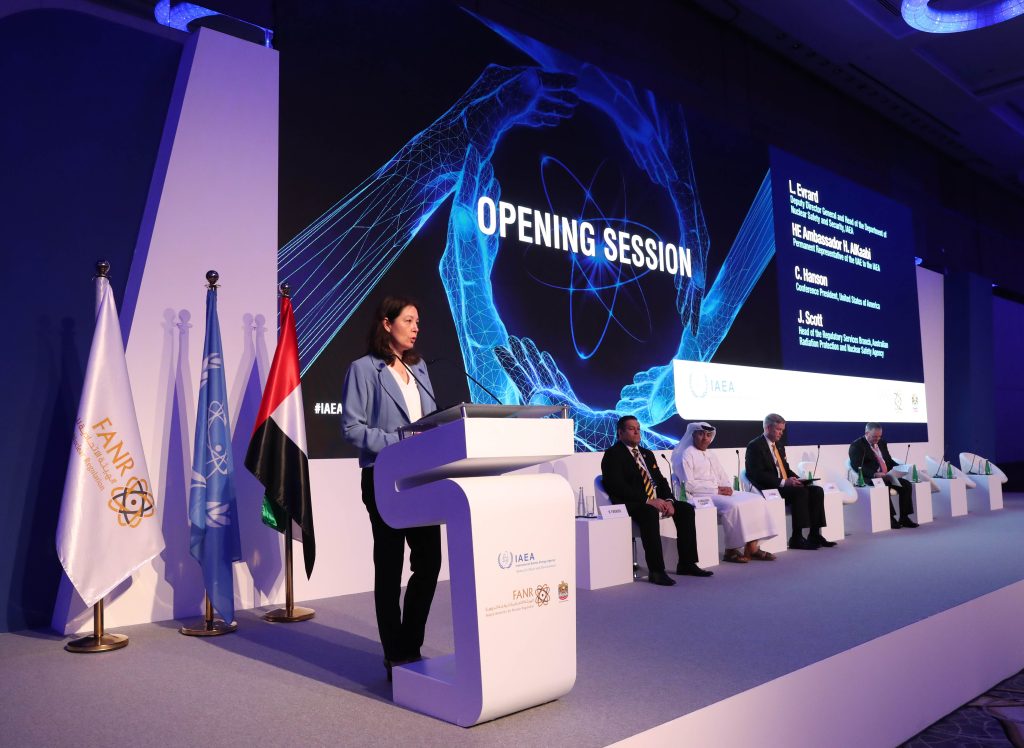International Atomic Energy Agency conference kicks off in Abu Dhabi

Abu Dhabi, The Gulf Observer: An international conference on nuclear and radiation regulatory systems in Abu Dhabi is discussing several important topics such as regulatory experience and agility to respond to new and emerging challenges in a changing environment as well as regulatory approaches to innovation and technologies.
The conference on “Effective Nuclear and Radiation Regulatory Systems: Preparing for the Future in Rapidly Changing Environment,” taking place in Abu Dhabi from 13th to 16th February, is organised by the International Atomic Energy Agency (IAEA) and hosted by the UAE’s Federal Authority for Nuclear Regulation (FANR).
In one of the biggest gathering of nuclear and radiation regulators, more than 580 participants from 95 countries and four international organisations will be discussing the important topics, focused on the role of the global regulatory community to ensure the effective regulatory systems.
“This conference, the sixth International Conference on effective regulatory systems, plays a key role in the field of nuclear and radiation safety and nuclear security,” said Lydie Evrard, International Atomic Energy Agency (IAEA) Deputy Director-General and Head of the Department of Nuclear Safety and Security.
She added, “Collectively sharing regulatory experiences and expertise, disseminating knowledge as well as sharing the best practices, lessons learned, and novel solutions will help regulators and the international community contribute to worldwide efforts to enhance nuclear safety and security.”
Evrard further said, “The environment we are working in is always evolving. Some of the changes we are experiencing can be disruptive. Within our mandate as regulators and as the IAEA, we have to adapt our way of working to address these new challenges, while keeping the focus on maintaining nuclear safety and security at the highest levels possible.”
The four-day Conference will cover regulatory approaches to innovation, emerging and new technologies, including regulatory harmonisation and international and regional cooperation.
Other key topics that will be addressed are the concrete efforts to maintain regulatory credibility and trust as well as capacity building to ensure regulators are prepared for future needs through the use of education, human resources, knowledge management, and knowledge networks. Additionally, life extension of nuclear facilities, decommissioning and safe and secure management of radioactive sources and radioactive waste will also be discussed.
In his opening remarks, Ambassador Hamad Al Kaabi, Permanent Representative of the UAE to the IAEA, said, “Given the likely impacts of issues on the nuclear industry such as cybersecurity, introduction of Artificial Intelligence, the small modular reactors and the nuclear fusion, these challenges require from us to be prepared and foresee the future to ensure that our regulatory infrastructure are both efficient and effective and able to address these trends.
“The development of the UAE’s robust nuclear regulatory infrastructure was the result of our long and strong cooperation with national and international partners, and in particular our close cooperation with the IAEA. The IAEA’s support, since the inception of the UAE’s nuclear energy programme in 2008, was instrumental and significant in developing regulations, policies and standards, hence positioning the UAE a role model for nuclear newcomer countries,” said Al Kaabi.
The conference is the sixth in a series of International Conferences on Effective Regulatory Systems. The first Conference was held in 2006 in Moscow, followed by Cape Town in 2009, Ottawa in 2013 and Vienna in 2016 and Hague in 2019.
During the conference, a side event “Youth Panel: Young Professionals Competition” will be held where the young professionals will present initiatives and ideas to improve the nuclear regulatory systems’ effectiveness. There will be a panel discussion, exhibition and posters showing different technologies and practices.


